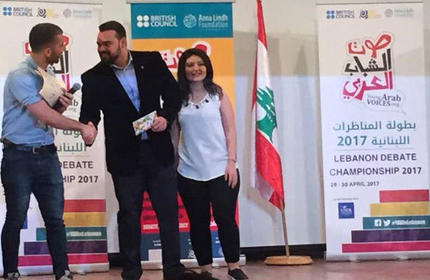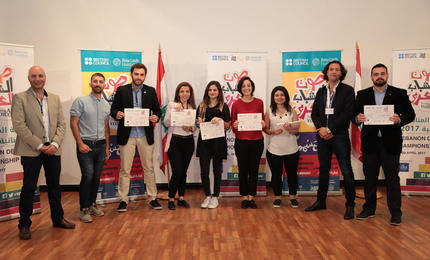LAU wins Young Arab Voices debate again
Following on last year’s achievement, LAU students from different majors dominate the national debate competition and win against AUB and NDU.

The Young Arab Voices program was jointly launched by the British Council and the Anna Lindh Foundation in 2011.
A team of four LAU students won first place in a national English-language debate competition late last month, making it the second year in a row that the university has taken home the top debate prize.
The winning team competed against students from the American University of Beirut (AUB) and Notre Dame University (NDU) during the Young Arab Voices (YAV) debate competition, arguing against increasing taxes on the profits of Lebanese banks and in favor of restricting the ability of elected officials to own media outlets.
“Often in the Arab world, youth are told to be quiet and listen, that the problems of the country aren’t theirs to worry about and that their opinions don’t matter. This stigma is wrong,” said Ameer Alsamman, a Political Science and International Affairs student at LAU and one of the four participating team members. “Young Arab Voices allows the youth to showcase their ability to make a difference in the society they live in and will inherit,” he added.
Alsamman’s peer, MEPI Tomorrow’s Leaders scholar Sofiane Timtaoucine was granted the award for best speaker in the English-language debates.
A Political Science and International Affairs student from Algeria, Timtaoucine expressed his belief that Lebanon, specifically, had a lot to gain from the practice.
“The reason why Lebanon needs [debate] is because it is a state that is built on differences and acceptance. The only way those two are sustainable is if they are intertwined, in other words, if differences are accepted,” he said, adding that debate, as a practice, is premised on broadening perspectives through diverging opinions.
Such ability to articulate their thoughts and to win followed months of preparations organized by LAU’s Outreach and Civic Engagement unit in cooperation with the British Council and local NGO Masar.
During the training, students were coached in the importance, elements, and stages of debate, including how to analyze a motion and how to structure arguments and counterarguments. The trainees also took part in five closed debates within the LAU community and two open debates with students from AUB and NDU as further practice.
“After the training, students became knowledgeable in structuring their arguments and providing relevant evidence. They became experienced in the role of each speaker and skilled in debating, whether they were chosen to play the role of the government or opposition team,” said Zeina Shehayeb, one of the trainers.
For team member and marketing student, Farah Mastoura, the quality of the training they received was one of the “key reasons” behind their success. Mastoura also noted that cooperation among her team during the debate made for a very cohesive group.
The debate competition which was held on April 29-30 on the Holy Spirit University of Kaslik campus, was the latest installment of a series of events hosted by the YAV program―a project jointly launched by the British Council and the Anna Lindh Foundation in 2011 with the aim of developing skills and opportunities for youth-led debate across the Arab region.
“British parliamentary debate is based on principled negotiating techniques whereby you attack the problem and never the person,” says Assistant Vice President for Outreach and Civic Engagement Elie Samia. “You use objective criteria to persuade the opponent, all while being concrete and impactful, and our student leaders showed that they are up to that challenge.”
More
Latest Stories
- Student Pharmacists: Serving Through Uncertainty
- Research Highlight: Dr. Elie Bouri on Cryptocurrency
- The Threat of Gram-Negative Bacteremia on Public Health in Lebanon
- A Frontline Like No Other: Students Take Action
- Fostering Healthy Connections in Times of Conflict
- The Crucial Role of Anesthesiologists in Mass Casualty Response
- Another Groundbreaking Discovery by the LAU Genetics Team
- LAU Faculty Recognized Regionally for Teaching Innovation


